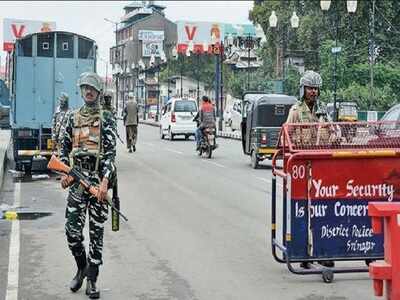- News
- India News
- J&K encounters kill chances of cell phones coming alive
Trending
This story is from October 8, 2019
J&K encounters kill chances of cell phones coming alive
Curbs on mobile phones in the Kashmir Valley may not be lifted any time soon in view of continuing infiltration and inputs about increased attempts by Pakistan-backed terrorists to target security installations, convoys and civilians defying their shutdown diktat.

Terror encounters over the last week in Ramban and Ganderbal have served to reinforce the apprehension that Pakistan-backed elements are determined to engineer terror attacks and create unrest, sources in the central security establishment said.

When contacted, J&K DGP Dilbag Singh told TOI, "Terrorists holed up in the Valley and newly-infiltrated groups are here obviously to indulge in attacks. They are uncomfortable that Kashmiri people are coming out in large numbers and resuming their normal routine, and want to disrupt this. But the security forces are adequately deployed and we are taking care that terrorists do not succeed. We will undertake pre-emptive strikes in the days to come."
Singh said both the Ramban encounter, in which three terrorists were killed on September 29, as well as arrest of a terrorist from a newly-raised group in Baramulla on Sunday were operations initiated by J&K police. Senior security officers conceded that with infiltration and terrorist activity set to pick up ahead of onset of winter, chances of mobile services being resumed or top political leaders being released any time soon were slim. The assessment coincides with inputs about a recent meeting among Jaish-e-Mohammad, Lashkar-e-Taiba and Hizbul Mujahideen commanders in Pulwama. The meeting is understood to have resulted in a "division of labour" with Jaish targetting convoys, LeT security installations and Hizbul Jammu & Kashmir police and political activity.
Sources in intelligence agencies said rising ceasefire violations indicated clear instructions from Pakistan's ISI that restoration of normalcy must be thwarted. "That the Kashmir issue failed to make any impact at the UNGA has made the local people give up their 'wait and watch' attitude and they are now resuming their daily activities," said an officer.

About the Author
Bharti JainEnd of Article
FOLLOW US ON SOCIAL MEDIA







